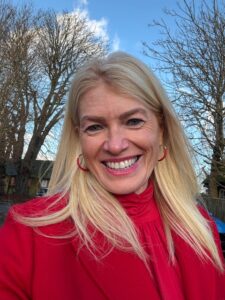 I’d had counselling and therapy for decades, but all it seemed to do was keep my head an inch above water. I was only really dealing with surface-level stuff with my therapist; I never went deep enough to understand why I allowed myself to be treated disrespectfully, why I didn’t value myself more and why I didn’t make lasting changes in my life to make it more fulfilling.
I’d had counselling and therapy for decades, but all it seemed to do was keep my head an inch above water. I was only really dealing with surface-level stuff with my therapist; I never went deep enough to understand why I allowed myself to be treated disrespectfully, why I didn’t value myself more and why I didn’t make lasting changes in my life to make it more fulfilling.
Outwardly, I had it all. I appeared successful, confident, capable and a ‘go-getter’, managing work and family seamlessly. Internally, it was a whole other story. My life was missing something. I lacked a meaningful relationship with myself, a relationship where I could feel secure, knowing that I was of value and worthy of loving myself. Deep down, I just didn’t believe that I was.
I realised I’d spent years putting everyone else first and ensuring that their happiness and needs were all met, but at the expense of my own; I found myself always last in the queue. I was gradually retreating further and further into myself. But underneath it all, there was a fire waiting to burn. I’m naturally a real action taker, and I knew I needed to change something to be able to move forward.
I was originally introduced to self-development by an ex-partner and as the years rolled by, I started to think about lots of aspects in my life that I hadn’t properly addressed. Like lots of people who decide to do the Process, I felt ‘stuck’ in patterns of behaviours and thinking that weren’t serving me anymore, for example, never doing anything by halves. When I got married (at 24) and decided to have a family, it went along the lines of ‘I’m going to have a family’ and I had one child each year until – Hey presto! – I had four children. I’d had an undiagnosed eating disorder for 30 years which I’d never really got to the bottom of. Some people turn to drink or drugs or shopping; my crutch was an unhealthy relationship with food. I also had patterns of being in dysfunctional relationships, and ‘rescuing’ people, which drove me towards picking the wrong partners.
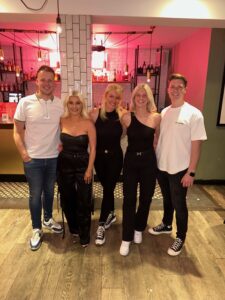 I’ve never been a victim. I’ve always taken ownership and responsibility for myself, because I think that the only person that can change you is you – and I knew I didn’t want just more of the same. I needed to do something different. I needed to create lasting change in my life, I needed some more tools. I needed to find something that could propel me into the next chapter.
I’ve never been a victim. I’ve always taken ownership and responsibility for myself, because I think that the only person that can change you is you – and I knew I didn’t want just more of the same. I needed to do something different. I needed to create lasting change in my life, I needed some more tools. I needed to find something that could propel me into the next chapter.
I was hungry to learn how I could improve things for me and help me to design and create a life that I would love and feel happy with. The Process seemed to be just the right thing to help me do this.
I was diagnosed with ASD (Autism Spectrum Disorder) and then ADHD in my 50s. This was a complete revelation for me; it finally explained my unusual patterns of thinking, my different ways of being, my disconnect from people and my lacklustre approach to socialising. In the past I’d just thought that this was a case of me being incapable, and had always felt like I was ‘on the outside’ looking in. Now I knew that wasn’t my fault, and that I had something concrete to work with. I could work from a perspective of understanding myself rather than self-criticism. Another reason to do the Process.
Despite having some reservations at the outset, the Process turned out to be just the turning point I needed to make a shift and find my voice. I remember even the very first time we gathered in a circle. As we went round, everybody spoke, and when it got to me, I just burst into floods of tears. And I remember thinking, ‘What on earth will people think of me? I can’t even introduce myself.’ I felt so far outside my comfort zone.
However, that was clearly what I needed to do at that time. I realised I was there to rid myself of all my old unsupportive habits and that I was going to have to learn to speak more kindly to myself. I had the support of three amazing facilitators who held and guided me and the palpable love of my fellow participants. Years of pent-up sadness came flooding out – and that was totally OK.
There is so much I loved about the week, and having the time to write and reflect. I particularly loved the sessions where we were encouraged to have fun and be playful, and I found it therapeutic to recognise how important laughter, fun and light heartedness are in life. This was something very new to me.
My thoughts fell into place around how I see people and how they see me. For instance, I know logically that I don’t like everyone, so how could I possibly expect everyone to like me? And that’s totally fine – let’s just find the ones that do align. The feeling I gained on the Process week that ‘It’s absolutely OK just to be me’ brought a new sense of liberation. I was able to find a new level of understanding of myself and learn more tools to help me navigate life’s paths with less judgment or concern around how others regard me.
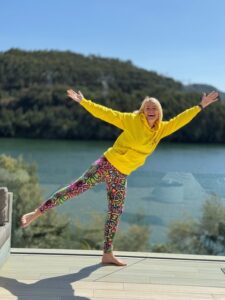 If I think about how the Process impacted my life overall, I’d say I’m much better at self-acceptance and boundary setting now. I don’t allow other people to destroy my peace of mind. I set boundaries and keep people at arm’s length that I don’t feel are enhancing or adding to my life. I’m definitely still a work in progress, but the transformation since the Process has allowed me to be in my own space with much more confidence and clarity. I think my ability to internally evaluate my emotional state and regulate it comes from a much more connected perspective. I no longer wonder why I have reactions to situations; I understand it now. I’ve also got these amazing tools at my fingertips. I can choose to stay in turmoil, or I can choose to use the tools.
If I think about how the Process impacted my life overall, I’d say I’m much better at self-acceptance and boundary setting now. I don’t allow other people to destroy my peace of mind. I set boundaries and keep people at arm’s length that I don’t feel are enhancing or adding to my life. I’m definitely still a work in progress, but the transformation since the Process has allowed me to be in my own space with much more confidence and clarity. I think my ability to internally evaluate my emotional state and regulate it comes from a much more connected perspective. I no longer wonder why I have reactions to situations; I understand it now. I’ve also got these amazing tools at my fingertips. I can choose to stay in turmoil, or I can choose to use the tools.
A few years after my original Process, I went on the Hoffman Summer Retreat, which helped me further with processing my ASD/ADHD diagnosis. It reinforced that I could give myself the permission I needed to be more accepting of myself and embrace all the nuances and quirky behaviours that have characterised my life.
The things I learnt about myself on the Hoffman Process and the Summer Retreat have guided me towards my new business based around kindness. My vision after the Process involved me going back to basics; to recognise that what really matters in life is our connection with others. It really helped me understand that kindness was one of my key core values and I wasn’t going to dim my light on it anymore.
Because of social media and advances in digital technology, we’re supposedly more connected than ever and yet at the same time we’ve got a loneliness epidemic going on. It feels as if society has got overly concerned about how many likes and followers we have, but in the meantime, we’ve lost the routine and habit of saying nice things to people. My vision centred around spreading kindness in a way that was easily accessible to all by using our voices, and that’s why I developed the app ‘Cheer We Go’.
I originally had the idea when running the London marathon in 2015. I hit the wall at mile 20, and I really didn’t think I was going to be able to finish it. To keep myself going, I just imagined what my kids would be shouting at me, and I kept this on a loop in my head until I finished the race. It really kept me motivated and driven. After I finished, I tried to find an app that would help me record collections of messages for events in the future but when I couldn’t find anything, I ended up parking it. And then my ex-husband was critically ill in intensive care. Each time the kids left the hospital, I kept thinking, ‘What if he doesn’t make it through the night? What if he’s awake at 2am and he’s got no one there next to him?’ The idea of a kindness messaging app was again staring me in the face.
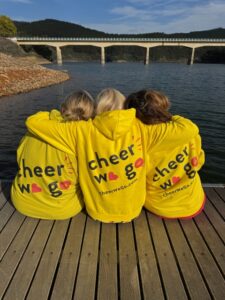 And so ‘Cheer We Go’ was born, as a way to cheer people on, or cheer people up. It’s like having a cuddle you can listen to again and again through a collection of voice notes recorded for your Superhero loved one. They can hear the messages and get that boost just when they need it most, and the power of the voices of their own ‘Cheer Squad’ lifts them up and supports them in their own challenges.
And so ‘Cheer We Go’ was born, as a way to cheer people on, or cheer people up. It’s like having a cuddle you can listen to again and again through a collection of voice notes recorded for your Superhero loved one. They can hear the messages and get that boost just when they need it most, and the power of the voices of their own ‘Cheer Squad’ lifts them up and supports them in their own challenges.
I experimented first with a short compilation of messages for a friend’s birthday. After receiving his messages from his friends and family, we met for lunch. This 60-year-old businessman was in floods of tears at the table and so full of gratitude. He said it was the best birthday present he could have had, and one that he didn’t know he even needed. He’s played it every day since receiving it!
‘Cheer We Go’ has been a year in the making and we’ve just gone live, with anyone now being able to get started for free. I’ve learned a lot along the way about myself (and about the technical challenges of app development!) but the greatest gifts have been around kindness to myself and the incredible power or sharing kindness with each other. I’m now looking to collaborate with charities and organisations to spread these kindness messages far and wide.
Since completing the Process, I’ve met so many other Hoffies who are also using the tools we learned to get in touch with the real them and having the courage to put the authenticity out into the world, and that’s what it did for me. The Process is just the whole package – both nourishing and helpful. I’m now finally ‘Living life on Purpose’ – which has always been my motto, but which has only just begun to feel real and possible.
To find out more about Caroline’s app, visit: https://cheerwego.com




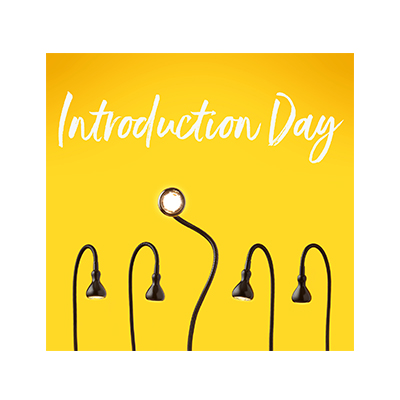

 Sign up to receive monthly newsletters from Hoffman
Sign up to receive monthly newsletters from Hoffman